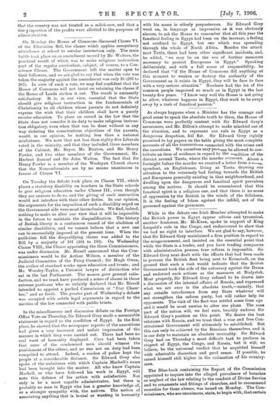While in the debate one Irish Member attempted to make
the British power in Egypt appear odious and tyrannical, another Irishman, Mr. McKean, spoke in support of King Leopold's rule in the Congo, and endeavoured to show that we had no right to interfere. We are glad to say, however, that Sir Edward Grey maintained a firm position in regard to the misgovernment, and insisted on the essential point that while the State is a trader, and you have trading companies with administrative powers, true reform is impossible. Sir Edward Grey next dealt with the efforts that had been made to prevent the British fleet being sent to Kronstadt, on the ground that such a visit would indicate that the British Government took the side of the autocracy against the Duma and endorsed such actions as the massacre at Bialystok. Most properly, Sir Edward Grey refused to be drawn into a discussion of the internal affairs of Russia, and expressed what we are sure is the absolute truth,—namely, that any outside interference from any State whatever will not strengthen the reform party, but will rather help its opponents. The visit of the fleet was settled some time ago and it would be most unwise to alter our plans. The sane part of the nation will, we feel sure, heartily endorse Sir Edward Grey's position on this point. We desire the best relations with Russia, and we trust that a wise and free Con- stitutional Government will ultimately be established. But this can only be achieved by the Russians themselves, and it is our duty to maintain an absolute neutrality. Sir Edward Grey had on Thursday a most difficult task to perform in respect of Egypt, the Congo, and Russia, but it will, we believe, be the universal verdict that be acquitted himself with admirable discretion and good sense. If possible, he raised himself still higher in the estimation of his country- men.


















































 Previous page
Previous page